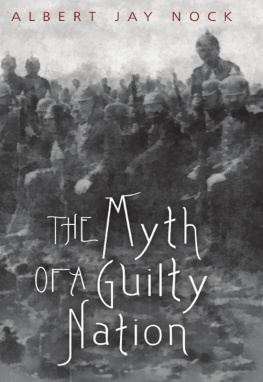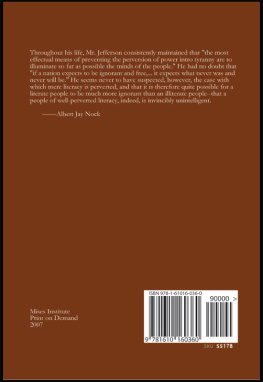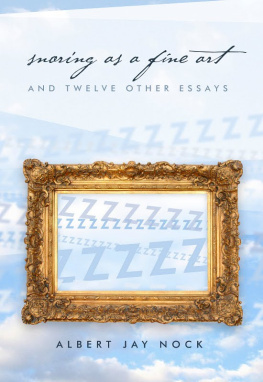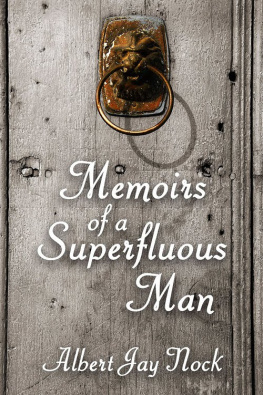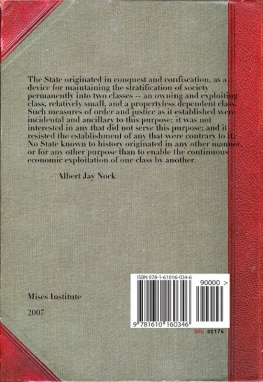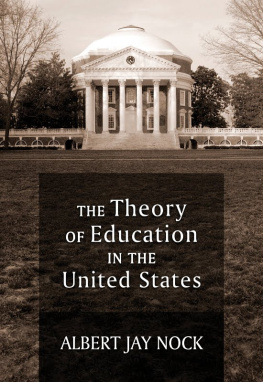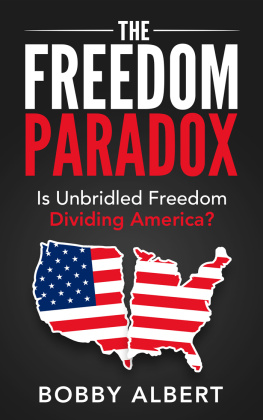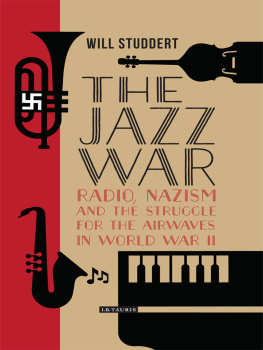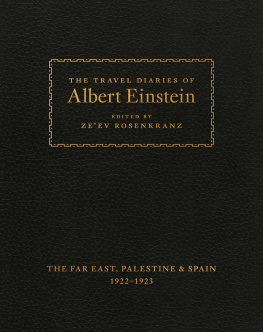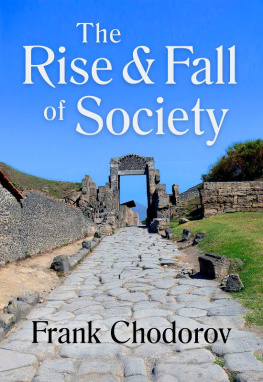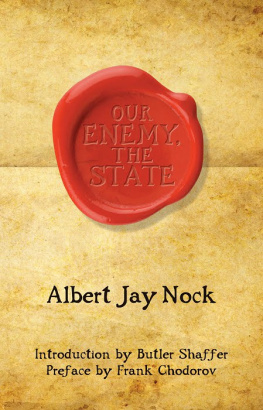THE MYTH OF A GUILTY NATION
THE MYTH OF A GUILTY NATION
BY
ALBERT JAY NOCK
(HISTORICUS)


Originally published in 1922 by B. W. Huebsch, Inc.
Published in 2011 by the Ludwig von Mises Institute.
Published under the Creative Commons Attribution License 3.0.
http://creativecommons.org/licenses/by/3.0/
Ludwig von Mises Institute
518 West Magnolia Avenue
Auburn, Alabama 36832
Ph: (334) 844-2500
Fax: (334) 844-2583
mises.org
10 9 8 7 6 5 4 3 2 1
ISBN: 978-1-61016-238-8
Introduction
by Anders Mikkelsen
Albert Jay Nock wrote one of the first American books of WWI Revisionismrevising the received story of why WWI began. As a lover of history, what is particularly fascinating about his book The Myth of a Guilty Nation is not whether this is the best explanation for WWI. What is fascinating is the great contrast Nock makes between two wholly different views of the origin of the war. What everyone knew about the origins of The Great War at the time are quite different from what everyone knows now.
The common American notion was that Germany was responsible for the war. No less a personage than David Lloyd George declared What are we fighting for? To defeat the most dangerous conspiracy ever plotted against the liberty of nations; carefully, skilfully, insidiously, clandestinely planned in every detail, with ruthless, cynical determination.
By reading the book we start to see just how differently people viewed the origin of the war at the time, especially in the U.S. Since WWI the revisionists won many of the battles, WWI is usually viewed today more as a tragedy, a pointless disaster, the effect of secret diplomacy, general militarism, etc. The reader today is therefore unaware of how many Americans understood the war as the sole outcome of a German conspiracy for plunder. While today we know Europe was an armed camp, the pro-allied propaganda claimed that Europe was unprepared for war. Nock makes the reader aware of the great extent to which the allied politicians continually lied to blame Germany and justify the war, or at least told stories with no regard for the truth. No wonder Hitler found British propaganda so inspiring. In fact the story at the time made it sound like Germany was trying to over-run Europe the way Hitler temporarily did a few decades later.
What Nock brings to the fore is the extent to which WWI may be viewed as the opposite of a conspiracy by Germany. If there was a conspiracy it would have been by the allied Entente powers. To a large degree it was blundered into by state officials, whose desire for peace was fatally undermined by their imperialist ambitions.
We should first note that he also touches on how many powerful parties simply wanted peace. However, small powerful parties in France, Britain, and Russia all pushed for war and created secret treaties amongst each other. As Ralph Raico pointed out, English foreign policy was dominated by a small, secret clique no more answerable to Parliament and the people than a dictatorship like Nazi Germany. Those who knew of Englands secret obligations lied to Parliament and denied their existence.
As Nock shows, English, French and Russian foreign policy was directed against Germany and Austria-Hungary, and military spending was quite large, and much greater than Germany and Austria-Hungarys. All three had powerful cliques who were aggressive towards the Central Powers. They were bound by secret treaties, though this alliance was not publicly acknowledged.
In Nocks book, this is roughly what happened to start WWI: Serbia and the Balkans had a foreign policy dominated by Russia. The assassins of Archduke Ferdinand were linked to the Russian pro-war clique. Russia had been test mobilizing since the spring of 1914, and its army alone was equal to Germany and Austria-Hungary combined. Russia had a secret treaty with France calling for France to support Russia if Russia mobilized and went to war. The UK had a secret treaty with France calling for it to support France during war, and to a much lesser but important degree, Russia. Bound by secret treaties all three powers found themselves thrust into war. Germany saw itself encircled by superior numbers. (Therefore it had to defeat France and Russia in decisive battles before it succumbed in a war of attrition. Similar to Israels situation when faced with a land war against three neighbors.)
The assassination of the Archduke Ferdinand, conveniently for the Pro-War Entente cliques, set off the train of powder to the powder keg of a general European war of France, Russia and England against Germany and Austria-Hungary.
For sources Nock makes great use of Belgian diplomatic correspondence, which noted little evidence of German aggression. The Soviet Union also released many embarrassing secret documents from the Tsarist archives. Nock highly recommends English Liberals Francis Neilsons and E. D. Morels works of WWI revisionism. (Neilsons How Diplomats Make War is hard to read, while Nocks is a breeze. Neilson focuses more on how English and other nations diplomats created uncertainty.) It should be noted too that Nock shows evidence that Belgian neutrality was a fig leaf to justify unpopular UK involvement.
Having documentation of a push for war by cliques in Russia, France, and England, Nock shows how German war guilt is a myth and, if anything, pro-war cliques in Russia, France, and England were successful in conspiring for war.
What makes this book worth reading is not whether this is the best explanation for WWI. It is worth seeing how small groups of state officials engaged in secret actions that led to a catastrophic war, and continually lied throughout the whole process to provide themselves ideological cover. What is fascinating is the great contrast Nock makes between two wholly different views of the origin of the war. While history and reality seem settled and known, people at different times have radically different understandings of the exact same events.
July 2011
New York City
Preface
THIS book is made up of a series of articles originally published in the Freeman. It was compiled to establish one point and only one, namely: that the German Government was not solely guilty of bringing on the war. I have not been at all concerned with measuring the German Governments share of guilt, with trying to show that it was either great or small, or that it was either less or more than that of any other Government or association of Governments. All this is beside the point. I do not by any means wish to escape the responsibility of saying that I think the German Governments share of guilt in the matter is extremely small; so small by comparison with that of the major Powers allied against Germany, as to be inconsiderable. That is my belief, demonstrable as I think by such evidence as has now become available to any candid person. But this has nothing whatever to do with the subject-matter of this volume. If the guilt of the German Government could be proved to be ten times greater than it was represented to be by the publicity-bureaux of the Allied Powers, the conclusion established in the following chapters would still remain. Guilty as the German Government may have been; multiply by ten any estimate that any person, interested or disinterested, informed or uninformed, may put upon its guilt; the fact remains that it was far, very far indeed, from being the only guilty party concerned.
If there were no practical end to be gained by establishing this conclusion, if ones purpose were only to give the German Government the dubious vindication of a

